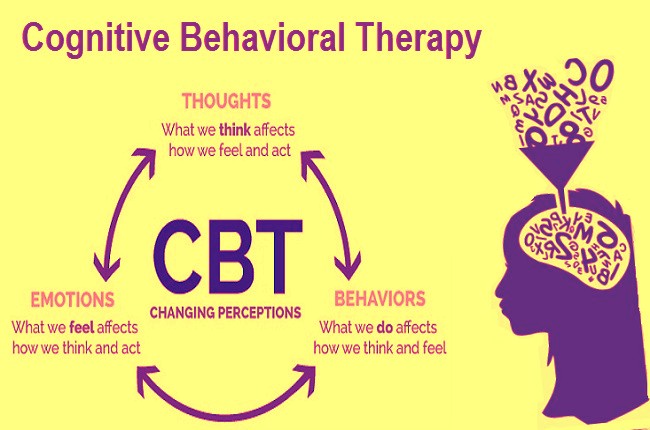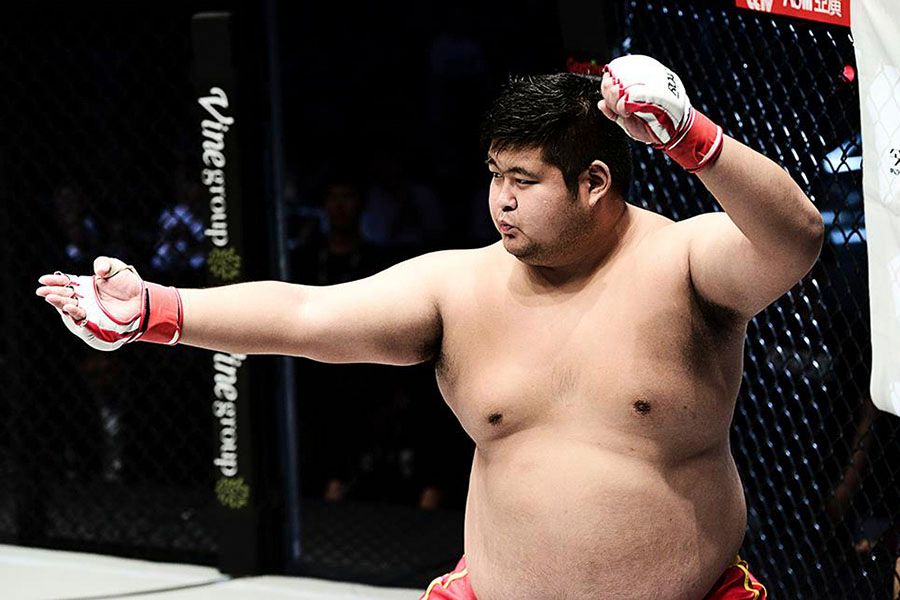
For MMA fighters, losing excess weight and improving their fighting skills go hand in hand.
Having unwanted belly fat can make them end up in higher weight classes where they’ll have to compete with much taller and longer opponents.
This is why weight loss is crucial in winning MMA fights.
But let’s face it, losing weight is not an easy task. It requires a lot of hard work and discipline, whether it’s through weight cutting or long-term weight loss for health reasons.
So, if you’re an MMA fighter looking to reach your weight loss goals and improve your fighting skills, remember to set specific goals and create an action plan to make it happen.
5 Effective CBT Techniques for Successful Weight Loss
Weight loss is a battle of the mind as much as it is of the body.
Multiple studies have proven that using psychological tools of cognitive behavioral therapy (CBT) increases the chances of losing weight dramatically.

CBT corrects negative thoughts and emotions by changing your reactions and self-defeating behaviors into positive and self-affirming thoughts.
This, in turn, can lead to lifestyle changes that support weight loss goals while keeping anxieties and negativity at bay.
CBT techniques can be a powerful tool for Mixed Martial Arts fighters looking to optimize their weight loss programs.
Much like MMA, every action thought, effort, and energy used in CBT techniques have a deeper meaning and can result in holistic, sustainable, and organic weight loss.
Here are some simple and effective weight-loss CBT techniques that you can try:
1. Realistic Goal-Setting

Many people give up on their New Year weight-loss resolutions because they have unrealistic expectations. Remember that getting into shape and losing excess fat takes time and commitment.
For MMA fighters, weight loss, and training are closely linked. Before taking action, they should evaluate their current state and visualize their goals.
Now set achievable goals and create effective plans that benefit both your desired body weight and fighting skills.
To ensure success, goal setting should be S.M.A.R.T:
- Specific
- Measurable
- Action Oriented
- Realistic
- Timely
When the end goal is to be the best version of oneself, this needs to be accompanied by a practical timeline and a sustainable routine.
Specific:
Setting specific goals is the first step in the process of creating a successful weight loss plan. Specific goals are clear and concise, outlining exactly what you want to achieve.
For example, instead of saying “I want to lose weight,” a more specific goal could be “I want to lose 5 kilograms in the next 2 months.”
This goal gives a specific target to work towards and a timeframe in which to achieve it.
Measurable:
Measurable goals provide a way to track progress and determine whether you’re on track to achieve your ultimate goal.
For example, a measurable goal could be “I want to lose 2 kilograms in the first month and 3 kilograms in the second month.”
This allows you to track your progress each month and make adjustments as necessary.
Action Oriented:
Action-oriented goals outline specific actions you will take to achieve your goals.
For example, instead of saying “I want to lose weight,” an action-oriented goal could be “I will do 30 minutes of cardio and 30 minutes of strength training every day.”
This goal outlines specific actions that will be taken to achieve the ultimate goal.
Realistic:
Setting realistic goals is important to ensure that the goal is achievable and sustainable. For example, if a fighter is aiming to lose 10 kilograms in a month, this may not be a realistic goal.
A more realistic goal could be “I want to lose 2 kilograms in the first month and 1.5 kilograms each subsequent month until I reach my goal weight.”
This goal is realistic and achievable while still maintaining progress towards the ultimate goal.
Timely:
Timely goals provide a timeframe in which to achieve the goal.
For example, a timely goal could be “I want to lose 5 kilograms in the next 2 months.”
This goal provides a specific timeframe in which to achieve the goal and helps create a sense of urgency to stay on track.
Additional Tips:
Expectations vs results:
Sometimes people expect to see a big change in their bodies right away when they start exercising or eating healthier. But that’s not always realistic.
Some days you might have a really good workout and feel great, but other days you might feel tired or not do as well.
If you’re always expecting to see big changes right away and they don’t happen, it can make you feel disappointed and want to give up.
The risk of physical injury is higher as the body is stressed beyond what it is used to. The body needs to gradually adapt to training routines and higher intensities.
So it’s important to be patient and not expect too much too soon. Just keep working hard and over time, you’ll start to see the changes you want.
While recovering from an injury
As an MMA fighter, you may have experienced injuries or taken a break from training, which can make it harder to lose weight. This can be mentally tough, and it’s important to fight any negative thoughts or feelings of stagnancy.
Remember that progress takes time and setting achievable goals can help you stay motivated and positive throughout your weight-loss journey.
Understand your body’s limitations:
By spending time and energy to understand your body’s limitations, you can better establish a sense of your holistic self and identify the limit to which your body can be pushed. T
his will help you create a plan that is tailored to your unique needs and abilities.
Get the support you need
Working with a health trainer can also help you stay motivated and accountable throughout your weight loss journey.
They can offer guidance, support, and encouragement to help you stay on track and make progress toward your goals.
2. Tracking

Keeping track of the effort taken and its progress toward your goal is an important CBT strategy.
Use a journal:
It’s a good idea to make a journal to record what you’re eating and how much you’re working out.
This way, you can see how much progress you’re making and adjust your plan accordingly. Even if you’re doing everything right, there will always be challenges that can derail your progress.
Objective and timely tracking:
When you’re tracking your progress, it’s important to be objective and timely. In your journal, record what type and quantity of food you eat throughout the day.
Note the type and duration of workout sessions. Periodically measuring your weight, say weekly or biweekly, will help establish the connection between the effort put in and the results achieved. This helps you track the progress you’re making.
Identify patterns and behaviors:
Journaling or tracking your progress, help you identify patterns and behaviors that might be holding you back.
Maybe you’re more motivated to work out in the morning, or maybe you tend to eat more when you’re stressed. This helps identify what your best times to work out are, why you find desserts irresistible, how idle time was spent, etc.
Weed out what’s not working:
By tracking your progress, you can identify the things that are working and the things that aren’t.
You can then adjust your plan accordingly and work on establishing new behaviors.
The key to success is awareness
By recording what you eat and the workouts you do, you can establish a connection between your efforts and results. You can also identify patterns and behaviors that work best for you, as well as barriers that hinder your progress.
By understanding what works for you and being aware of your progress, you can establish new behaviors and coping mechanisms to stay motivated and overcome challenges.
MMA fighters advantage
Similar to how MMA fighters train and practice with a dedication to perfect their techniques, they also need to pay attention to their weight loss progress.
In fact, MMA fighters have an advantage because they are often more disciplined, sticking to their schedules and being honest about their successes and failures. Most importantly, they are willing to learn from the same.
3. Self Belief

Even though their opponents might be faster or fitter, overweight fighters like Fatty Fedor, the Kung Fu Panda (Aorigele), and James “The Grim Reaper” Roper can still win fights. This is because they have skills, experience, and confidence. However, being overweight doesn’t mean it’s okay to stay that way.
Having less fat and more muscle can help fighters move faster and with less energy, which means they will have more endurance, speed, and agility. This makes it easier for them to evade and attack their opponents.
Believing in yourself is key to successful weight loss
If you’re trying to lose weight, it’s important to believe in yourself and your ability to make a change.
Doubts can often stem from personal judgments and perceptions of oneself. A strong sense of belief in the ability to make a change increases the chances of successful behavioral change and prevents giving up early.
Thoughts like ‘Losing weight is tough’, ‘I am way too weak to give up tasty food’, or ‘I will hardly last a day in the gym’ reflect your lack of belief in yourself. Instead, you should think along the lines of ‘Losing weight might be tough, but with time and dedication, I know I can do it!’
By recognizing negative thoughts and converting them into positive affirmations, one can increase their chances of succeeding in the weight-loss program and living a healthy life. A belief in the self also determines the swiftness with which one recovers from failures and lapses in judgment.
Attitude matters when making changes
What really matters when making changes is the attitude one has during the process. It’s important to just get started and fuel success for tomorrow, even if there’s only low to moderate success on that day.
Being part of communities that are facing similar challenges is also a great way to reaffirm a strong sense of belief and confidence.
Learning from the experiences of others and finding motivation in their stories can be a powerful enabler of self-belief and confidence.
Get the support you need
Another way to reaffirm a strong sense of belief is by being a part of communities that are facing similar challenges.
Learning from the experiences of others, and finding motivation in others’ stories is a powerful enabler of self-belief and confidence.
MMA fighters advantage
Martial artists can use their honed abilities to be disciplined, confident, courageous, and aware to identify emotions and assumptions that serve as obstacles in their weight loss journey.
MMA fighters are familiar with the concept of focusing and centering, and thus, can easily apply the same to elevate their sense of self-worth.
Their already honed ability to be disciplined, confident, courageous, and supremely aware can come in handy to identify emotions and assumptions about their own self that serve as obstacles in their weight loss journey.
4. Feedback

Whether it’s losing weight, getting fit, or just improving our overall well-being, feedback is a valuable tool that can help us stay on track.
Balancing Ambition with Reality
When we set goals, it’s essential to get feedback from ourselves and others. This helps us keep our expectations in check and make sure we’re not setting unrealistic goals.
We should keep track of objective things like how many calories we’re eating, how long we’re exercising, and how much weight we’re losing.
But we also need to pay attention to how we feel, like if we’re feeling stronger, have more energy, and feel mentally better.
Seeking Feedback from Others
It can be helpful to seek feedback from family and friends on appearance, mood, and general fitness. Positive feedback can create a sense of joy and motivation, while negative feedback can lead to disappointment and frustration.
However, it’s important to remember that the purpose of seeking feedback from others is to gain an outside perspective, not to allow them to be negative.
Consult only those who are likely to provide genuine feedback.
Find Supportive Like-Minded Individuals
Lastly, it’s important to confide in like-minded individuals about our weight loss plans.
Sharing the ups and downs with someone who understands us can make us feel more secure and provide us with a fresh perspective on how to tackle everyday challenges.
Whether it’s a friend or family member, having someone who understands us can make all the difference in staying on track and achieving our goals.
It’s also helpful to get feedback from trained professionals on our diet, fluid intake, training regimens, and overall progress. This can offer timely and valuable course correction interventions.
Celebrate Your Progress
When we see improvements in these areas, it’s important to celebrate them!
This not only gives us an opportunity to reflect on our progress and achievements, but it also boosts our motivation levels.
MMA fighters advantage
MMA fighters are experts at this – they’re constantly reflecting on their progress and feeling the change in their bodies.
Martial artists must take the time to reflect on their journeys, feel the change in their bodies, and get used to their strengthened versions of themselves.
5. Incentives

It’s not easy for fighters to control their food intake, but it’s a testament to their dedication when they have enough discipline to do so. However, they also need the motivation to stay on track.
Recognition and rewards can be natural incentives for humans to keep doing what they have been doing. But it’s important to choose incentives carefully, and not equate them with giving in to temptation.
Effective Incentives: Internal vs External
Rewards can be helpful to change behavior, but we need to choose them carefully.
Internal rewards like feeling good about ourselves are more likely to keep us motivated in the long term than external rewards like food or money. These external rewards might work at first, but they won’t be enough to make lasting changes.
The best rewards are the ones that come from within and encourage us to stay active and mindful of what we eat.
Choosing Valuable and Measurable Incentives
When selecting incentives, two things must be kept in mind: the incentive must be valuable, and it must be measurable.
For instance, every time a weight-loss goal is met, or a cream coffee is passed over for green tea, a dollar can be put aside as a reward.
Over time, the progress will be evident in terms of health benefits and savings made, and eventually, this behavior will become natural.
The Incentive: Win more MMA Fights
Extra fat is a burden for fighters as it hampers their movements, agility, and striking speed. It also decreases their endurance and stamina, as the additional fat cells require extra blood flow and energy to stay alive.
Therefore, reducing body fat percentage is vital for fighters as it increases their speed, which can be a game-changer in the ring.
Conclusion
MMA fighters can achieve their best performance by reducing excess body fat and maximizing muscle mass through targeted training. But weight loss isn’t just about physical exertion.
Successful programs also focus on changing behavior and improving mental health. This is where CBT tools come in handy.
By altering negative beliefs and perceptions, fighters can stay motivated and make better decisions about their diet and exercise.
With their determination, focus, and stamina, martial artists are particularly well-suited to using these strategies to achieve their weight loss goals.
